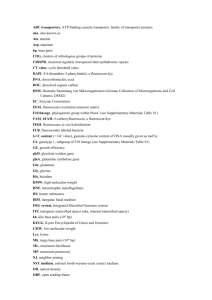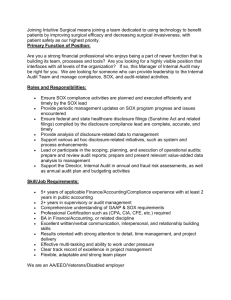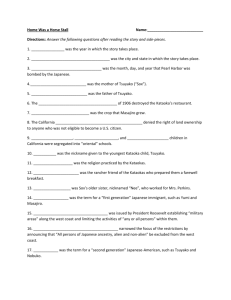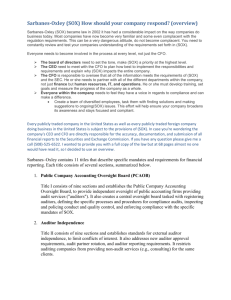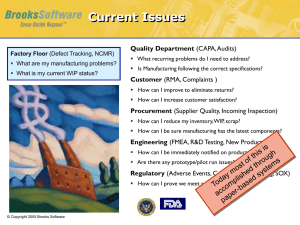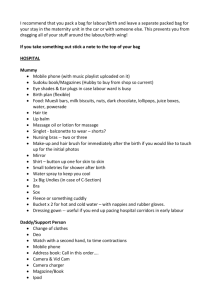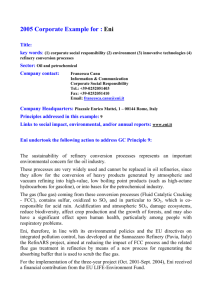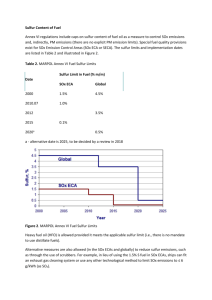report - Center for IT and e
advertisement
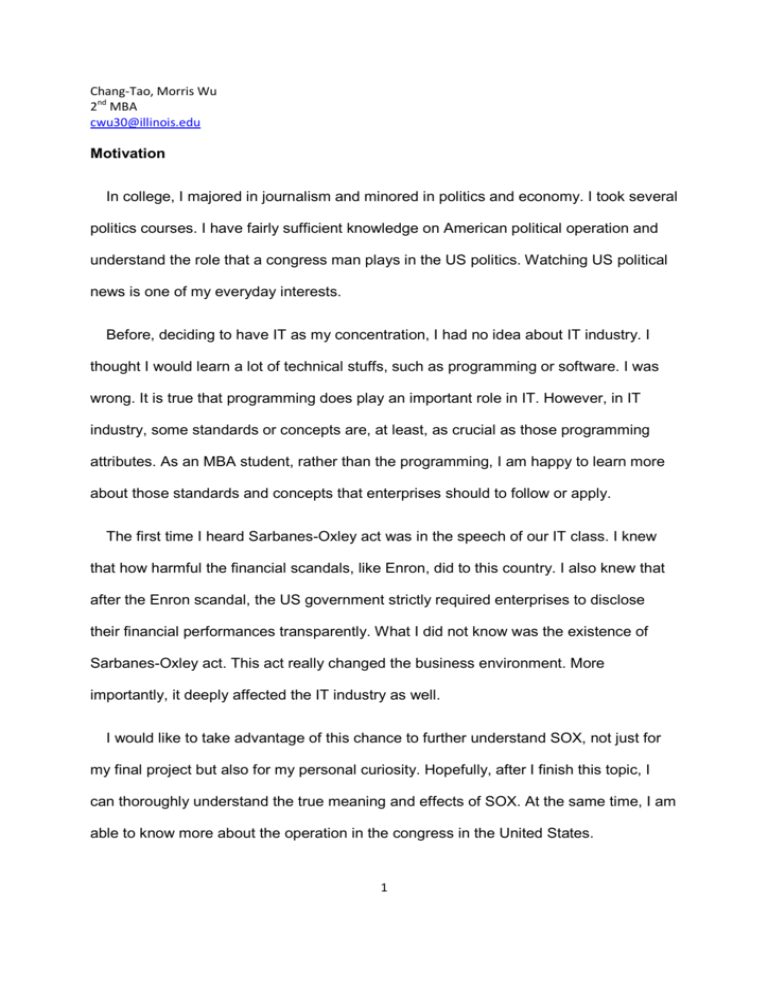
Chang-Tao, Morris Wu 2nd MBA cwu30@illinois.edu Motivation In college, I majored in journalism and minored in politics and economy. I took several politics courses. I have fairly sufficient knowledge on American political operation and understand the role that a congress man plays in the US politics. Watching US political news is one of my everyday interests. Before, deciding to have IT as my concentration, I had no idea about IT industry. I thought I would learn a lot of technical stuffs, such as programming or software. I was wrong. It is true that programming does play an important role in IT. However, in IT industry, some standards or concepts are, at least, as crucial as those programming attributes. As an MBA student, rather than the programming, I am happy to learn more about those standards and concepts that enterprises should to follow or apply. The first time I heard Sarbanes-Oxley act was in the speech of our IT class. I knew that how harmful the financial scandals, like Enron, did to this country. I also knew that after the Enron scandal, the US government strictly required enterprises to disclose their financial performances transparently. What I did not know was the existence of Sarbanes-Oxley act. This act really changed the business environment. More importantly, it deeply affected the IT industry as well. I would like to take advantage of this chance to further understand SOX, not just for my final project but also for my personal curiosity. Hopefully, after I finish this topic, I can thoroughly understand the true meaning and effects of SOX. At the same time, I am able to know more about the operation in the congress in the United States. 1 Chang-Tao, Morris Wu 2nd MBA cwu30@illinois.edu Background The Enron scandal exploded in 2001. Throughout the 1990s, Enron had tried to make up its accounting records to ensure its performance in the stock market. Enron's plunge occurred after it was revealed that much of its profits and revenue were the result of deals with special purpose entities. The result was that many of Enron's debts and the losses that it suffered were not reported in its financial statements. The scandal resulted in 4,000 employees losing their jobs and took the United States billions of dollars. The stock price fell to less than 50 cents. On December 2, 2001, Enron filed for bankruptcy, which was the biggest bankruptcy in US history. Enron’s CFO Andrew Fastow was sentenced to 10 years, CAO Richard Causey, 7 years, and CEO Jeffrey Skilling, 24 years. Financially, Enron scandal was the disaster that cost United States even more than the loss in the September 11 attacks. After Enron scandal, people in the United States suffered more from similar financial frauds, such as Worldcom, MCI, and Tyco. Those frauds also caused considerable losses. Other facts Sarbanes-Oxley Act was named after Senator Paul Sarbanes and Representative Michael Oxley, which was signed into law on July 30, 2002 by President Bush. Besides 2 Chang-Tao, Morris Wu 2nd MBA cwu30@illinois.edu a series of corporate frauds, Sarbanes and Oxley found that there were still many reasons that this country urgently needed an effective law to regulate companies, including: Auditor conflicts of interest—although before SOX, there were many auditing firms that supervised companies’ performances for investors, those auditing firms usually performed consulting or non-audit work for the companies they audited. To those auditing firms, the consulting work was more profitable than their auditing engagement. There, the auditing firms could not function well before SOX. Boardroom failures—those scandals revealed that boards or auditing committees did not play their roles effectively. Many board members did not exercise their responsibilities or did not have sufficient understanding of the businesses. Besides, board members were sometimes not independent. Securities analysts’ conflicts of interest—a securities analyst is the one who makes buy and sell recommendations on stocks and bonds. Through cooperating with investment bankers, a securities analyst could have a conflict of interests when issuing a buy or sell recommendation. Banking practice—investors would not be doubtful if major banks lent a firm large loans. In fact, those major banks did not have sound understandings about this firm. The major banks’ loans would release an incorrect message to investors that this firm was so healthy and integrate that they could mistakenly invest in the wrong company. 3 Chang-Tao, Morris Wu 2nd MBA cwu30@illinois.edu Birth of SOX Since Representative Oxley and Senator Sarbanes were proposing the similar act at the same time, although there were still several differences. To reconcile the differences, the House and the Senate formed a Conference Committee. On July 24, 2002, the Committee approved the bill and named it “the Sarbanes-Oxley Act of 2002.” On the next day, the House and the Senate passed this act without overwhelmed margin of victory. On July 30, 2002, President Bush signed it into law and concluded “the most far-reaching reforms of American business practices since the time of Franklin D Roosevelt.” 11 Titles of SOX Sarbanes-Oxley contains 11 titles to mandate and require companies considering the financial reports. Title 1 Public Company Accounting Oversight Board (PCAOB)—Public Company Accounting Oversight Board is established to provide independent oversight of public accounting firms offering audit services or auditors. Title 1 also creates a central oversight board to register auditors, define the specific processes and procedures , inspect ad police conduct and quality control, and enforce compliance with the specific mandates of SOX. 4 Chang-Tao, Morris Wu 2nd MBA cwu30@illinois.edu Title 2 Auditor Independence—to reduce conflicts of interest, Title 2 establishes standards for external auditor independence. Besides, Title 2 also contains new auditor approval requirements, audit partner rotation, and auditor reporting requirements to prevent those auditing companies from providing non-audit services for the same clients. Title 3 Corporate Responsibility—Title 3 cites that senior executives should take individual responsibility for the accuracy and completeness of corporate financial reports. Moreover, Title 3 defines the interaction of external auditors and corporate audit committees, and specifies the responsibility of corporate officers for the accuracy and validity of corporate financial reports. It also contains specific limits on the behaviors of corporate officers and mentions the civil penalties for non-compliance. Title 4 Enhanced Financial Disclosures—Title 4 asks for enhanced reporting requirements for financial transactions, which includes off-balance-sheet transactions, pro-forma figures and stock transactions of corporate officers. Internal controls are needed for assuring the accuracy of financial reports and disclosures. Still, Title 3 requires timely reporting of material changes in financial condition and specific enhanced reviews by the US Securities and Exchange Commission (SEC) or its agents of corporate reports. Title 5 Analyst Conflicts of Interest—Title 5 includes measures designed to assist restore investor confidence in the reporting of securities analysts. It defines the codes of conduct for securities analysts. Most importantly, it demands disclosure of knowable conflicts of interest. 5 Chang-Tao, Morris Wu 2nd MBA cwu30@illinois.edu Title 6 Commission Resources and Authority—Title 6 defines not only practices to restore investor confidence in securities analysts but also the SEC;s authority to censure or bar securities professionals from practice. It also defines conditions under which a person can be limited from practicing as a broker, adviser, or dealer. Title 7 Studies and Reports—Title 7 regulates conducting research for enforcing actions against violations by the SEC registrants and auditors. Studies and reports include the effects of consolidation of public accounting firms, the role of credit rating agencies in the operation of securities markets, securities violations and enforcement actions, and whether investment banks assisted the fraud companies, like Enron and Global Crossing. Title 8 Corporate and Criminal Fraud Accountability—Title 8 is also referred to as the “Corporate and Criminal Fraud Act of 2002.” It describes specific criminal penalties for fraud by manipulation, destruction or alteration of financial records. Title 9 White Collar Crime Penalty Enhancement—Title 9 suggests stronger sentencing guidelines and specifically adds failure to certify corporate financial reports as a criminal offense. Title 10 Corporate Tax Returns—Title 10 require chief executive officers to sign the company tax return. Title 11 Corporate Fraud Accountability— It identifies corporate fraud and records tampering as criminal offenses, which are joined to specific penalties. It also 6 Chang-Tao, Morris Wu 2nd MBA cwu30@illinois.edu strengthens the penalties. Finally, it enables the SEC to temporary freeze large or unusual payments. Overall, SOX addresses 4 areas: - It illustrates appropriate relationships between auditors and audited companies. - It defines appropriate and inappropriate corporate governance practices. - It regulates provisions with respect to corporate fraud and accountability - It establishes requirements that companies implement and document internal control systems to ensure the integrity of financial information reported to the public. SOX’s Impact Although the initial costs for companies to meet SOX were high, according to Financial Executives International (FEI) survey, the costs have continuously declined relative to revenues since 2004. In 2007, for 168 companies with average revenues of $4.7 billion, the average costs were $1.7 million, which is 0.036% of revenue, compared with 0.43% in 2006 and 0.52% in 2005. However, based on another studies conducted by the law firm of Foley & Lardner in 2003 and 2004 on the impact of SOX, the average annual cost of being a public company had nearly doubled after the enactment of SOX, from $1.3 million to 2.9 million for companies with revenues under $1 billion. Insurance for directors and officers 7 Chang-Tao, Morris Wu 2nd MBA cwu30@illinois.edu accounted for a significant portion of this increase. As a result, some companies have delisted the securities or elected to delay or cancel their initial public offering (IPO). By either going private or going “dark”, the companies that are listed with the SEC can avoid SOX. A company’s shares are no longer public traded if it chooses to go private. A company that chooses to go dark can continue to trade in the over-thecounter market, but it no longer has to file with the SEC. Criticism of SOX SOX is often criticized as wasting government’s and companies’ money. US corporations are at a competitive disadvantage with foreign companies. The cost of SOX compliance is another burden to corporations. In April 12, 2005, congressman Ron Paul stated, "These regulations are damaging American capital markets by providing an incentive for small US firms and foreign firms to deregister from US stock exchanges.” Some people are afraid that smaller public companies could choose to list in stock exchanges in other countries rather in US stock exchanges. A study by Wharton Business School reveals that since the enforcement of SOX Act, the number of US companies deregistering from public stock exchanges has almost tripled. It is not hard to understand that small businesses and foreign firms are not willing to register on US stock exchanges when SOX is considered costly and wasteful. 8 Chang-Tao, Morris Wu 2nd MBA cwu30@illinois.edu Small Businesses Benefits from SOX The compliance with SOX contributes to high cost to be a public company. It could cause smaller companies not to go public and some companies to withdraw from the public markets. No matter public or private, SOX impacts all companies through the provisions concerning to enforcement of federal laws and regulations. Therefore, a private company entrepreneur who hopes to be acquired by a public company has to meet the requirements of SOX as well. Investors may regard SOX compliance as a best practice or as a signal of the company’s health although this company is not required. As a result, they may be encouraged to invest in the companies that have SOX compliance. Not SOX compliant companies may find it more expensive, compared with SOX compliant ones, in fund raising. SOX’s Effects on Non-US Companies In the United Kingdom, the non-statutory Combined Code of Corporate Governance is inspired by and plays similar role to SOX. The Alternative Investment Market reveals that its impressive growth in listings almost coincided with the Sarbanes-Oxley legislation. In Japan, there is also a similar regulation enforced. Now, countries all over the world are having or discussing to make the law to prevent corporate frauds. According to Kate Litvak, the SOX Act’s effect on non-US companies that are crosslisted in the US depends on the companies’ origins. By complying with SOX regulation, 9 Chang-Tao, Morris Wu 2nd MBA cwu30@illinois.edu companies from badly regulated countries benefit from better credit ratings. But companies from well regulated countries could only cost more to meet the SOX regulation. Conclusion In 2001, people experienced several significant events that seriously damaged people’s lives and believes. 911 attacks were the first time the United States has been attacked outside of the country since it was established. Thousands of people sacrificed their lives in the tragedy. Then, the world has been suffered from wars until now although Afghanistan and Iraq were defeated and Saddam Hassan was executed years ago. Enron was another historical scandal that human beings will keep in mind forever. Over 4,000 employees lost their jobs and numerous investors ended with nothing simply because Enron’s greedy and unfaithful management. The scandal not just devastated the Enron group but also affect the whole US stock market and even though the world. Human beings can never learn from wars. Peaceful earth is always a fairy tale in people’s dreams. What makes me comfortable is that we do learn from the Enron scandal. SOX is costly and could make US corporations lose their competitiveness in this highly competitive business world. I find people in the United States have the courage to take those disadvantages to establish a safer and healthier environment. To 10 Chang-Tao, Morris Wu 2nd MBA cwu30@illinois.edu establish a just society, one who does anything illegal should be punished. One who takes advantage of his position to operate illegally should be seriously punished. Although SOX is definitely not perfect, at least, we seldom hear some corporate frauds now. However, even with a perfect law, don’t trust those systems too much. The most important is the ethics education. Only eliminating the greedy side in humans’ minds by appropriate education can people enjoy a fair environment. . Reference techFAQ, http://www.tech-faq.com/sarbanes-oxley.shtml US Securities and Exchange Commission, http://www.sec.gov/ The CPA Journal, The Chilling Effects of Sarbanes-Oxley: Myth or Reality? , http://www.nysscpa.org/cpajournal/2006/606/infocus/p14.htm Sarbanes-Oxley Compliance Journal, The Impact Of Sarbanes Oxley On Companies, Investors, & Financial Markets, http://www.sox.com/dsp_getFeaturesDetails.cfm?CID=1141 BizTime.Com, Small companies also can benefit from Sarbanes-Oxley, http://www.biztimes.com/news/2008/2/22/small-companies-also-can-benefit-from-sarbanes-oxley 11 Chang-Tao, Morris Wu 2nd MBA cwu30@illinois.edu Metric Stream, SOX Essentials for Small Public Companies, http://www.metricstream.com/webinars/webinar_28aug07.htm Kappa Beta Weblog, Criticism’s of SOX, http://kappabeta.wordpress.com/2007/06/19/criticisms-ofsox/ Translegal Digest, Increased Criticism for Sarbanes-Oxley, http://www.translegal.com/digest/modules/smartnews/item.php?itemid=11 South Park Pundit, Critics of my SOX Criticism, http://stephenwstanton.blogspot.com/2005/03/critics-of-my-sox-criticism.html Wikipedia, Sarbanes-Oxley Act, http://en.wikipedia.org/wiki/Sarbanes-Oxley_Act 12
